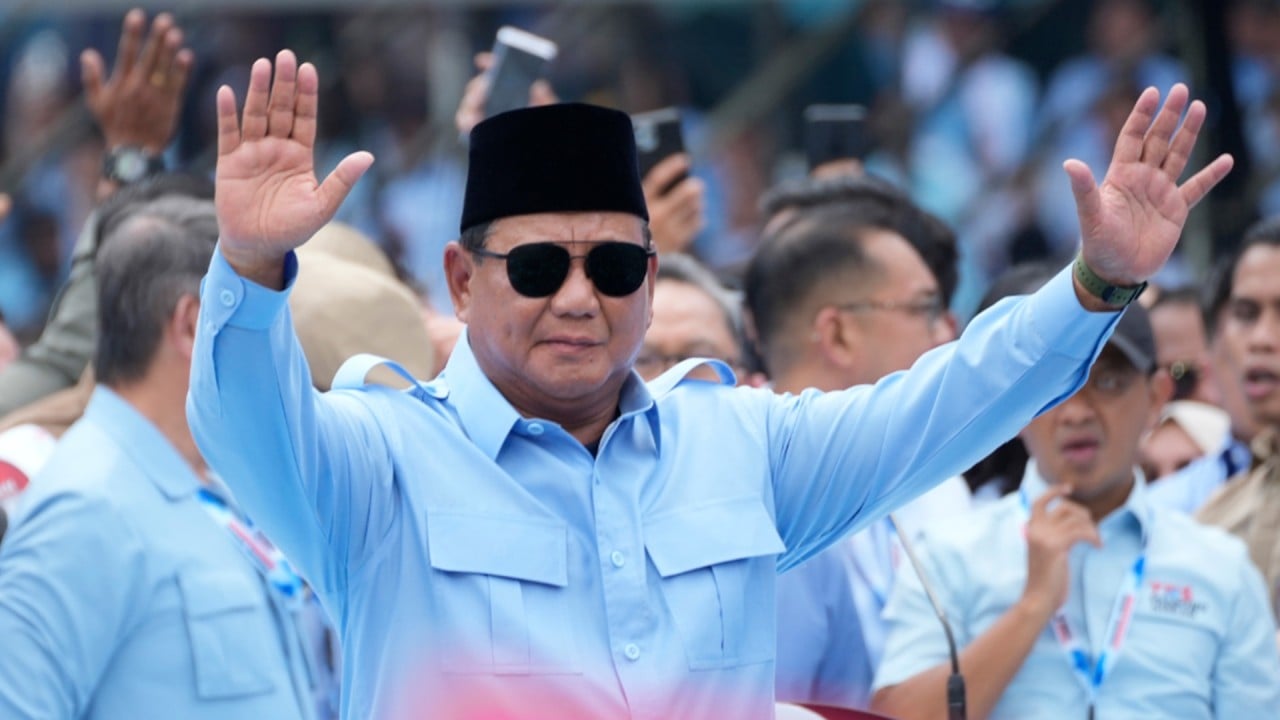
Will Indonesia’s Prabowo face pre-election fraud investigation – or could party jockeying save him?
- Lawmakers could vote on whether to start an investigation into alleged irregularities in the run-up to last month’s election won by Prabowo Subianto
- Such an inquiry could look at the neutrality of the security forces and distribution of politically motivated social aid, an analyst says
Observers anticipate that a vote on the inquiry could take place on Tuesday when lawmakers in Indonesia’s House of Representatives are scheduled to conclude their recess and resume their legislative activities.
Analysts are unsure how many parties plan to press on with the inquiry, particularly when some of them are trying to align themselves with Prabowo as he assembles his ruling coalition.
‘Vulgar’: Indonesia’s Jokowi slammed for awarding Prabowo 4-star military rank
As the official election results are scheduled to be announced on March 20, calls have mounted for an investigation into supposed election fraud, fuelled by allegations of voter intimidation as well as the misuse of government resources to garner support for Prabowo.
According to Nicky Fahrizal, a political researcher at the Centre for Strategic and International Studies (CSIS) in Indonesia, the inquiry would not be aimed at alleged irregularities on the day of the vote but in the lead-up to the poll.
“The parliamentary inquiry right is specifically aimed at conditions that occurred before the election. This includes issues such as the neutrality of the police, army, and [state officials]; distribution of social assistance with political [motivations]; and the mobilisation of state instruments,” Fahrizal said. “Additionally, it addresses whether there are election contestants who benefited from state resources or were sponsored by the state.”
At least five parties affiliated with Anies and Ganjar’s camps have made statements to suggest they would launch an inquiry through the House of Representatives to investigate what they perceive as “structured, systematic, and massive” fraud in the electoral process.
The parties calling for the inquiry parties hold a slim majority of 54 per cent in the House, controlling 314 out of the 575 seats. In contrast, the Prabowo camp led by the Gerindra Party holds only 45 per cent of the seats.
Will Indonesia’s unpredictable president-elect continue Jokowi’s China approach?
While the outcome of the investigation cannot overturn the election results, it could serve as a powerful tool to attack Widodo over the role he played during the election.
“The purpose of the electoral fraud investigation is to assess how the government spent money before election day,” said Wasisto Raharjo Jati, a political analyst with the Jakarta-based National Research and Innovation Agency.
“If this investigation happens, the parties will have more power and leverage to criticise or impeach Jokowi,” he added, referring to Widodo by his popular nickname.
Three of the parties that backed Anies’ presidential run – NasDem, the National Awakening Party (PKB), and the Prosperous Justice Party (PKS) – have said they were willing to participate in the investigation.
Anies’ election running mate, PKB chairperson Muhaimin Iskandar, said on Friday: “The alliance of political parties behind myself and Anies is ready, solid and will propose [the legislative inquiry].”
NasDem secretary general Hermawi Taslim said that the parties had sufficient data and evidence to prove their allegations, and were waiting on support from the ruling Indonesian Democratic Party of Struggle (PDI-P) to take the lead in launching the inquiry.
PDI-P, which backed Ganjar’s bid, said last week that it had formed a “special committee” that was gathering evidence of any substantial electoral fraud.
“[This special team] will provide a recommendation regarding a complete strategy, with a timetable and possible options in exercising the right of inquiry,” PDI-P secretary general Hasto Kristiyanto said on Wednesday.
But analysts say that there is uncertainty about whether the investigation would prove fruitful, particularly as the parties that had supported the rival candidates during the election remain part of Widodo’s broad ruling coalition.
“Most of the parties in parliament are on the side of the current [Widodo] government … so I think the internal support to embrace an investigation is limited,” Wasisto said.
‘We need Swiftonomics’: Indonesia eyes hosting mega stars to boost tourism
“One by one, the parties that are looking into the investigation will be approached by Jokowi …[the president] wants to ensure that there is no turbulence within [parliament],” he said.
There are indications the jockeying has started, with Widodo meeting NasDem party chairman Surya Paloh for a dinner at the State Palace in February, supposedly to discuss the election results and invite the party to join a potential future Prabowo coalition.
Fahrizal from CSIS said the parties hoping to launch the inquiry would have to present a united front and “resist pressure from the executive power”.
Otherwise, they could face “significant difficulties in exercising the House’s investigative rights, particularly during the impeachment stage,” he said.
While there might be some members of these parties who are interested in pursuing the inquiry, others might be looking out for their self-interests, particularly as it has become increasingly evident that Prabowo would win the presidency by a wide margin.
Lippo Group’s John Riady on his hopes, dreams for Indonesia, the family business
“At the end of the day, most of the parties would want to be a part of the ruling coalition,” said Wasisto, adding that they would be angling for concessions that Prabowo might offer them to join his coalition.
“Being an opposition party in Indonesia is very challenging. You cannot access the source of funding, you cannot access the policymaking arena … and that’s why these parties will think twice before taking on the side of the opposition,” he said.


